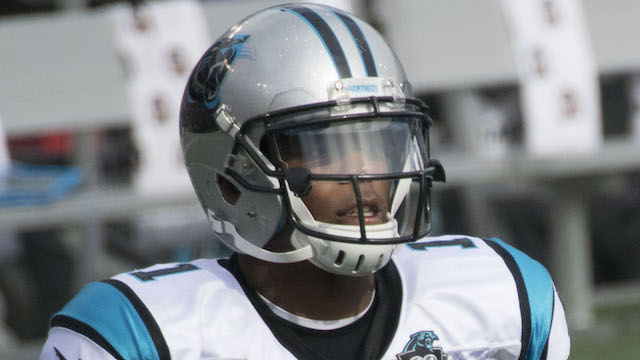Every part of an athlete’s life is put under a microscope at all times. This is not news to those of us who follow professional sports, nor for me as someone who interviews athletes and covers fights on a weekly basis. The scrutiny comes with the paycheck. The more successful you are, the greater the focus becomes, and athletes are expected to “pay the price” with dignity and grace. It’s as though the general public has this deep-seated conviction that athletes are lottery winners who don’t deserve the money and fame they earned, even though they already paid the price through injuries that carry devastating life-long consequences.
It’s something you’ll see over and over again in all forms of entertainment though – we praise people on the way up, then condemn them when they finally crack under pressure, then cheering if they claw back up to the top only to secretly wonder if they’ll fail yet again. For Cam Newton the story is much the same – called Superman when he dominates other NFL teams and called Super Sulk when he fails to deliver in the league’s biggest game. The alleged controversy here is that Newton didn’t feel like answering questions after a game that was widely expected to be Newton’s coronation as the NFL’s new king. Newton had an amazing season with the Panthers where he was named the league’s MVP. He handed footballs to young fans in the stands after touchdowns, flashed a perfect smile in win after win, and seemed to be doing things on the field that no NFL quarterback had done at his level – a scoring threat with his arm and his legs. In every way he fulfilled what the public expects from great athletes – win AND be a role model – executing flawlessly in both areas of your life.
What we learned on February 7th, 2016 following Super Bowl 50 is that “Superman” is actually human, and he reacted the way a normal human being would to reaching the pinnacle of sporting accomplishment only to be shoved off the mountain top. The fall hurts both physically and emotionally, and to be honest I relate more to Cam Newton for being hurt by it than I would if he had faked his way through a post-game interview with smiles and snappy answers. I would suggest to those people who have been watching his press conference over and over again, picking it apart in their eagerness to tear Newton down some more, that they’ve missed the fact that he actually showed more grace than most people under such scrutiny. He was sacked six times, his body and mind were both reeling from the game, but he answered questions as best he could and eventually walked away rather than say something that WOULDN’T have been classy or dignified. How is walking away suddenly equivalent to being a “Super Sulk” anyway? The press would have loved to eat up him going on a foul-mouthed tirade about how much losing sucks, but in lieu of the real controversy that would have generated sports writers manufactured one anyway just to fill up newspaper columns and half hour talk shows.
For me it’s clear that characterizing this as a lack of poise and grace from the NFL MVP can also take on an extra dimension of the old tired cliche that black quarterbacks don’t succeed at the highest level, even though Russell Wilson and Doug Williams have both proved that theory wrong, both in recent memory and dating back to my youngest years watching football. Thankfully there are a few people who get the pressure Newton is under, not just to prove that he can be the face of a team and a league, but that he also has to be the face of all black athletes to lead a team who came before him or after him. Despite not succeeding at the moment he was expected to triumph, he’s only 26 years old and ultimately has many more championship games in his future. Let’s all gain a little perspective and take the lens focused on Newton to shine it elsewhere, and what seems like a big controversy about him “sulking” will in the end turn out to have been a very small thing after all. He’ll still be “Superman” when the NFL comes back this fall and the Panthers make another playoff run.

